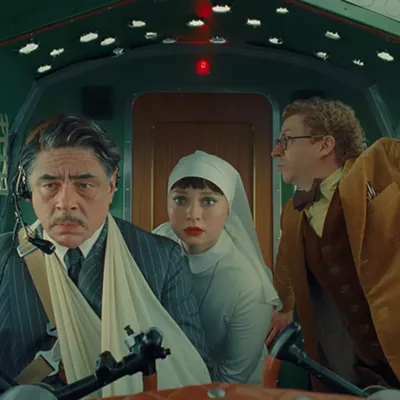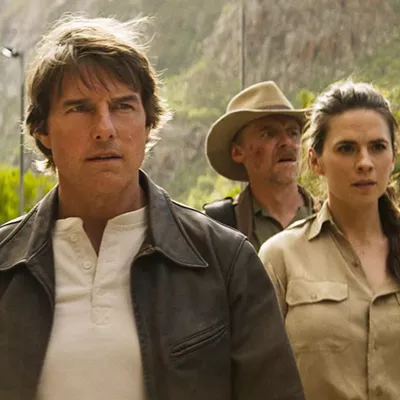The Hannibal Lecter horror movie franchise (Silence of the Lambs and Red Dragon) gets an extraneous third installment from best-selling novelist and scriptwriter Thomas Harris. With more than 150 films to his credit, iconic film producer Dino De Laurentiis valiantly attempts to compensate for the material's manifest shortcomings by stacking the cinematic deck with an ardently talented cast and crew that execute the story with bold performances against a European backdrop.
French actor Gaspard Ulliel (Strayed) plays the incipient cannibal who, after his affluent parents are murdered by Nazis near his family's Lithuanian castle, witnesses the cannibalization of his younger sister by a desperate pack of rogue soldiers who take the siblings hostage in a nearby hunting lodge. Hannibal goes temporarily mute before he's taken to a brutal Soviet orphanage that solidifies his detached reasoning about cruelty, just before he escapes to Paris, where his widowed Japanese aunt, Lady Murasaki (Gong Li, Memoirs of a Geisha), welcomes him. It isn't long before Hannibal's indoctrination into Japanese traditions, French cuisine and medical techniques sends him on a revenge-killing spree unlike any other.
Director Peter Webber (Girl With a Pearl Earring) grabs your attention with a staggering wartime opening sequence that looks like something out of a Paul Verhoeven movie. A fighter plane crashes into a manned Nazi tank near the castle grounds, and production designer Allan Starski (The Pianist) puts the metallic taste of war into your mouth as the dark shadows of death fall on the winter ground. Immediately, the filmmakers establish an anti-war theme that foreshadows an imagined aftermath of personal devastation that will inevitably deal out bizarre internalized forms of violence for the surviving victims and their oppressors.
However, it's here too that the audience starts to be robbed of its own dark and abstract ideas about the source of Hannibal's nefarious desires. As suspense and horror master Alfred Hitchcock taught filmmakers and audiences, the true nature of fear lives in the piqued imagination of the spectator. Using our imaginations to fill in the blanks about the motivations of a Norman Bates or a Hannibal Lecter is half of the fun.
Silence of the Lambs is one of the scariest films of the past 20 years because we are led to contemplate the potential for evil behind the dilated pupils of Anthony Hopkins' demented character. Hannibal's disposition for a twisted empathy toward Jodie Foster's perfectly vulnerable Clarice Starling is deeply unsettling because it suggests a strange reciprocal relationship between them and the cryptic serial killer Buffalo Bill whom she attempts to locate. Hopkins' Hannibal penetrates Starling's psyche and consequently our own subconscious via Foster's character as our cherished protagonist. The subtle narrative raises unpleasant questions about our own susceptibility to destructive influences, and provides grist for our nightmares to sort out.
In Hannibal Rising, our protagonist is the killer. With a deep dimple on his left cheek that doubles as a scar of unimaginable origin, Gaspard Ulliel is endlessly watchable. Ulliel's strikingly handsome features belie the internal wounds of Hannibal's traumatic childhood that we become privy to. And so, when a butcher at a public French market insults Lady Murasaki about the direction of her genitalia, we look forward to Hannibal's bloody revenge that will necessitate the use of a samurai sword in the service of a comical decapitation. The scene takes place at a clearing near a lake where the butcher fishes, and it is the most enjoyable sequence of the movie for the gallows humor that the filmmakers inject.
Enter Inspector Popil (Dominic West) to investigate the murder and provide the story with retrograde momentum. Then, having whetted his appetite for murder, Hannibal sets about hunting down and dispatching the soldiers who cooked his little sister and shared the broth of her soup with him. Details about Hannibal's taste for consuming the cheeks of his victims seem a perfunctory touch, as does his evolving love affair with his aunt who becomes a willing accomplice to his crimes.
Director of Photography Ben Davis (Layer Cake) captures dense visual compositions that succeed in giving fertile, classical underpinnings to Thomas Harris' formulaic plot. For all of the story's lack of suspense and terror, it is Ulliel who makes the movie dramatic. His is an audacious performance that bewitches the viewer into relishing something that we should not. But there is nothing to be frightened of in Hannibal Rising.














